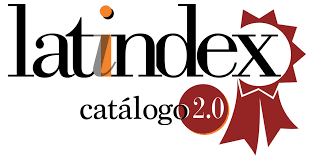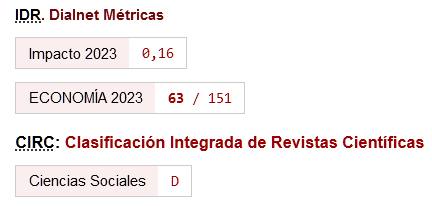Equidad de Género en las Oportunidades Económicas en América Latina, 1990-2010
Palabras clave:
desigualdad de género, empleo, desempleo, informalización y pobreza, regímenes políticosResumen
Este artículo analiza la evolución de la desigualdad de género en las oportunidades económicas en 18 países latinoamericanos, desde 1990 a 2010. Examinamos la reducción de la pobreza y de la desigualdad y reafirmamos que son logros económicos significativos en América Latina y el Caribe en esta época. No obstante hay evidencia de que dichos beneficios no se han traducido en una mayor igualdad de género en esferas económicas. Evaluamos cambios en las oportunidades económicas por género mediante un análisis descriptivo de datos de empleo, desempleo, informalización, salarios y pobreza, por país y región. Además, exploramos cómo estas variaciones se relacionan con los diferentes regímenes políticos gobernantes durante la década del milenio. Encontramos que las disminuciones de las brechas de género en las tasas de empleo, la informalización y los salarios urbanos, quedan contrarrestados por incrementos en las desigualdades en el desempleo y la pobreza. También sostenemos que hay evidencia preliminar indicando que la política social ha sido más importante en la disminución de la desigualdad en el ingreso entre los hogares y en la reducción de la pobreza que las políticas orientadas al mercado laboral.
Descargas
Citas
Amsden, Alice. (1989). Asia's Next Giant: South Korea and Late Industrialization. Oxford, UK: Oxford University Press.
Atkinson, Anthony B., Thomas Piketty, y Emmanuel Saez (2011) "Top Incomes in the Long Run of History," Journal of Economic Literature, 49(1):3-71. https://doi.org/10.1257/jel.49.1.3
Barrientos, Armando. (2011). On the Distributional Implications of Social Protection Reforms in Latin America. UNU-WIDER Working Paper No. 2011/69.
Berg, Janine. (2011). Laws or luck? Understanding rising formality in Brazil in the 2000s, in S. Lee and D. McCann (eds) Regulating for Decent Work: New directions in labour market regulations, Geneva and Basingstoke, ILO and Palgrave Macmillan. https://doi.org/10.1057/9780230307834_5
Birdsall, Nancy, Nora Lustig y Darryl McLeod. (2011). Declining Inequality in Latin America: Some Economics, Some Politics. Working Paper 251, Center for Global Development.
https://doi.org/10.2139/ssrn.1888348
Braunstein, Elissa and James Heintz. (2008). Gender Bias and Central Bank Policy: Employment and Inflation Reduction. International Review of Applied Economics 22(2), 173-86.
https://doi.org/10.1080/02692170801889643
Cornia, Giovanni Andrea, Juan Carlos Gómez-Sabaini & Bruno Martorano. (2011). A New Fiscal Pact, Tax Policy Changes and Income Inequality. UNU-WIDER Working Paper No. 2011/70.
Cornia, Giovanni Andrea. (2010). Income Distribution under Latin America's New Left Regimes. Journal of Human Development and Capabilities 11(1): 85-114. https://doi.org/10.1080/19452820903481483
Cornia, Giovanni Andrea. (2012). Inequality Trends and their Determinants. Latin America over 1990-2010. UNU-WIDER Working Paper No. 2012/09.
Damill, Mario and Roberto Frenkel. (2012). Macroeconomic Policies, Growth, Employment, and Inequality in Latin America." UNU-WIDER Working Paper No. 2012/23.
Epstein, Gerald and Erinc Yeldan. (2008). Inflation Targeting, Employment Creation, and Economic Development: Assessing the Impacts and Policy Alternatives. International Review of Applied Economics 22(2), 129-130. https://doi.org/10.1080/02692170801889676
Grown, Caren, Geeta Rao Gupta, and Zahia Khan. (2003). Promises to Keep: Achieving Gender Equality and the Empowerment of Women. Background Paper for the Task Force on Education and Gender Equality of the Millennium Project, International Center for Research on Women, Washington, D.C.
Keifman, Saúl N. and Roxana Maurizio. (2012). Change in Labour Market Conditions and Politics. Their Impact on Wage Inequality during the Last Decade. UNU-WIDER Working Paper No. 2012/14.
Lustig, Nora, Luís F. López-Calva y Eduardo Ortiz-Juarez. (2011). The Decline in Inequality in Latin America: How Much, Since When and Why?, Tulane University, Working paper 1118, April 2011.
https://doi.org/10.2139/ssrn.2113476
McLeod, Darryl y Nora Lustig, 2010. "Inequality and Poverty under Latin America's New Left Regimes," Fordham Economics Discussion Paper Series dp2010-13, Fordham University, Department of Economics.
Madrid, Raúl L., Wendy Hunter, and Kurt Weyland. (2010). The Policies and Performance of the Contestatory and Moderate Left,in Kurt Weyland, Raúl L. Madrid and Wendy Hunter (eds.) Leftist Governments in Latin America: Successes and Shortcomings. Cambridge: Cambridge University Press, pp. 140-180. https://doi.org/10.1017/CBO9780511778742.007
Martorano, Bruno and Giovanni Andrea Cornia. (2011). The IDLA Dataset: A Tool to Analyze Recent Changes in Income Inequality in L.A. http://www.wider.unu.edu/research/current-programme/en_GB/Impact-of-Economic-Crisis/
Molyneux, Maxine. (2006). Mothers at the Service of the New Poverty Agenda: Progresa /Oportunidades, Mexico's Conditional Transfer Programme, Social Policy & Administration Vol. 40, Nº 4, August. https://doi.org/10.1111/j.1467-9515.2006.00497.x
Molyneux, Maxine. (2009). Conditional Cash Transfers: A 'Pathway to Women's Empowerment'? Ver: www.pathwaysofempowerment.org/PathwaysWP5-website.pdf
Ocampo, José Antonio and Juliana Vallejo. (2012). Economic Growth, Equity and Human Development in Latin America." Journal of Human Development and Capabilities 21(1), 107-133.
https://doi.org/10.1080/19452829.2011.637395
Ocampo, José Antonio. (2007). "The Macroeconomics of the Latin American Economic Boom." CEPAL Review 93, 7-28. https://doi.org/10.18356/10ea5b8d-es
Palma, José Gabriel. (2011). Homogeneous Middles vs. Heterogeneous Tails, and the End of the 'Inverted-U': The Share of the Rich is What It's All About. Cambridge Working Papers in Economics (CWPE) 1111. https://doi.org/10.1111/j.1467-7660.2011.01694.x
Peres, Wilson. (2011). Industrial Policies in Latin America. WIDER Working Paper No. 2011/48.
Rodriguez, Francisco y Arjun Jayadev, 2010. "The Declining Labor Share of Income," Human Development Research Papers (2009 to present) HDRP-2010-36, Human Development Report Office (HDRO), United Nations Development Programme (UNDP).
Rubery, Jill and Damian Grimshaw. (2011). Gender and the Minimum Wage. In S. Lee and D. McCann (Eds), Regulating for Decent Work: New Directions in Labour Market Regulation, Palgrave.
https://doi.org/10.1057/9780230307834_9
Seguino, Stephanie and James Heintz. (2012). Monetary Tightening and the Dynamics of Race and Gender Stratification in the US. American Journal of Economics and Sociology 71(3): 603-638.
Descargas
Publicado
Cómo citar
Número
Sección
Licencia
Esta licencia permite a terceros compartir (copiar y redistribuir el material en cualquier medio o formato) y adaptar (remezclar, transformar y crear a partir del material para cualquier finalidad, incluso comercial), siempre que se reconozca la autoría y la primera publicación en esta revista (La Revista, DOI de la obra), se proporcione un enlace a la licencia y se indique si se han realizado cambios en la obra.







